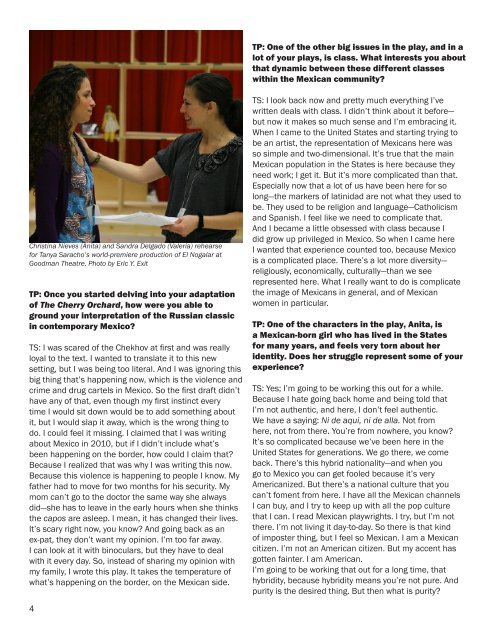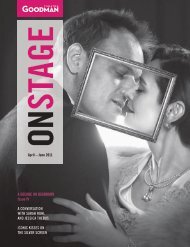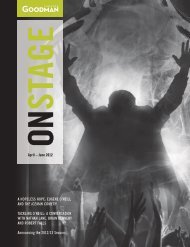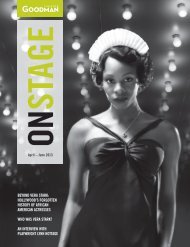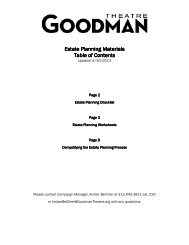El Nogalar Study Guide (9MB) - Goodman Theatre
El Nogalar Study Guide (9MB) - Goodman Theatre
El Nogalar Study Guide (9MB) - Goodman Theatre
Create successful ePaper yourself
Turn your PDF publications into a flip-book with our unique Google optimized e-Paper software.
TP: One of the other big issues in the play, and in a<br />
lot of your plays, is class. What interests you about<br />
that dynamic between these different classes<br />
within the Mexican community?<br />
Christina Nieves (Anita) and Sandra Delgado (Valeria) rehearse<br />
for Tanya Saracho’s world-premiere production of <strong>El</strong> <strong>Nogalar</strong> at<br />
<strong>Goodman</strong> <strong>Theatre</strong>. Photo by Eric Y. Exit<br />
TP: Once you started delving into your adaptation<br />
of The Cherry Orchard, how were you able to<br />
ground your interpretation of the Russian classic<br />
in contemporary Mexico?<br />
TS: I was scared of the Chekhov at first and was really<br />
loyal to the text. I wanted to translate it to this new<br />
setting, but I was being too literal. And I was ignoring this<br />
big thing that’s happening now, which is the violence and<br />
crime and drug cartels in Mexico. So the first draft didn’t<br />
have any of that, even though my first instinct every<br />
time I would sit down would be to add something about<br />
it, but I would slap it away, which is the wrong thing to<br />
do. I could feel it missing. I claimed that I was writing<br />
about Mexico in 2010, but if I didn’t include what’s<br />
been happening on the border, how could I claim that?<br />
Because I realized that was why I was writing this now.<br />
Because this violence is happening to people I know. My<br />
father had to move for two months for his security. My<br />
mom can’t go to the doctor the same way she always<br />
did—she has to leave in the early hours when she thinks<br />
the capos are asleep. I mean, it has changed their lives.<br />
It’s scary right now, you know? And going back as an<br />
ex-pat, they don’t want my opinion. I’m too far away.<br />
I can look at it with binoculars, but they have to deal<br />
with it every day. So, instead of sharing my opinion with<br />
my family, I wrote this play. It takes the temperature of<br />
what’s happening on the border, on the Mexican side.<br />
TS: I look back now and pretty much everything I’ve<br />
written deals with class. I didn’t think about it before—<br />
but now it makes so much sense and I’m embracing it.<br />
When I came to the United States and starting trying to<br />
be an artist, the representation of Mexicans here was<br />
so simple and two-dimensional. It’s true that the main<br />
Mexican population in the States is here because they<br />
need work; I get it. But it’s more complicated than that.<br />
Especially now that a lot of us have been here for so<br />
long—the markers of latinidad are not what they used to<br />
be. They used to be religion and language—Catholicism<br />
and Spanish. I feel like we need to complicate that.<br />
And I became a little obsessed with class because I<br />
did grow up privileged in Mexico. So when I came here<br />
I wanted that experience counted too, because Mexico<br />
is a complicated place. There’s a lot more diversity—<br />
religiously, economically, culturally—than we see<br />
represented here. What I really want to do is complicate<br />
the image of Mexicans in general, and of Mexican<br />
women in particular.<br />
TP: One of the characters in the play, Anita, is<br />
a Mexican-born girl who has lived in the States<br />
for many years, and feels very torn about her<br />
identity. Does her struggle represent some of your<br />
experience?<br />
TS: Yes; I’m going to be working this out for a while.<br />
Because I hate going back home and being told that<br />
I’m not authentic, and here, I don’t feel authentic.<br />
We have a saying: Ni de aqui, ni de alla. Not from<br />
here, not from there. You’re from nowhere, you know?<br />
It’s so complicated because we’ve been here in the<br />
United States for generations. We go there, we come<br />
back. There’s this hybrid nationality—and when you<br />
go to Mexico you can get fooled because it’s very<br />
Americanized. But there’s a national culture that you<br />
can’t foment from here. I have all the Mexican channels<br />
I can buy, and I try to keep up with all the pop culture<br />
that I can. I read Mexican playwrights. I try, but I’m not<br />
there. I’m not living it day-to-day. So there is that kind<br />
of imposter thing, but I feel so Mexican. I am a Mexican<br />
citizen. I’m not an American citizen. But my accent has<br />
gotten fainter. I am American.<br />
I’m going to be working that out for a long time, that<br />
hybridity, because hybridity means you’re not pure. And<br />
purity is the desired thing. But then what is purity?<br />
4<br />
<strong>El</strong><strong>Nogalar</strong>.indd 4<br />
3/25/2011 4:05:32 PM


